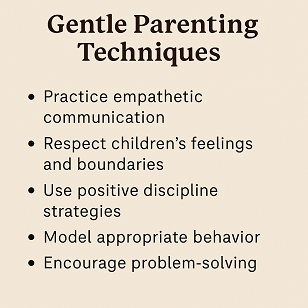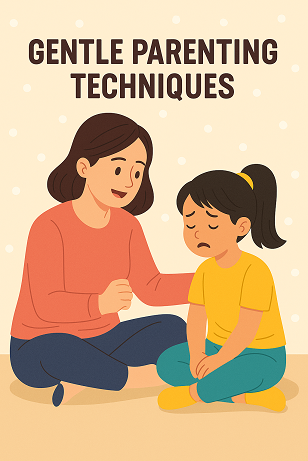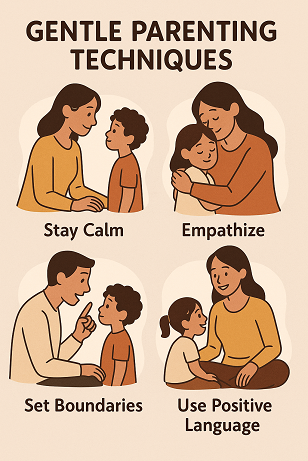Raising children isn’t just about setting boundaries and enforcing rules—it’s about building a relationship rooted in trust, understanding, and mutual respect. That’s where gentle parenting techniques come in. This approach focuses on empathy, communication, and consistency rather than punishment and control. It encourages children to become self-disciplined, emotionally aware, and respectful individuals.

What Is Gentle Parenting?
Gentle parenting is a philosophy that emphasizes respect, empathy, and boundaries. Unlike authoritarian styles that rely on fear or obedience, gentle parenting guides behavior through understanding and compassion. It’s not about being permissive—rules and limits still exist—but they are enforced with kindness, not aggression.
At its core, gentle parenting involves four key principles:
- Empathy – Understanding your child’s feelings and perspective.
- Respect – Treating your child as a person worthy of dignity.
- Understanding – Taking time to comprehend your child’s needs and triggers.
- Boundaries – Setting healthy, clear limits with consistency and love.

Why Choose Gentle Parenting Techniques?
Research shows that children raised with gentle parenting methods tend to have higher emotional intelligence, better coping mechanisms, and stronger interpersonal skills. They grow up feeling safe and supported rather than fearful or confused.
These techniques also help parents feel more connected and in control—without yelling or resorting to punishment. If you’re looking for a calmer home, deeper relationships, and a respectful bond with your child, then gentle parenting techniques may be your answer.
Top Gentle Parenting Techniques to Use Every Day
Let’s explore some practical and powerful gentle parenting techniques you can start applying today:

1. Connect Before You Correct
Before jumping into discipline, connect emotionally. Kneel to your child’s eye level, touch their arm gently, and acknowledge their feelings. “I see you’re upset because you want to play longer. I understand that.”
This creates trust and sets the stage for better listening.
2. Replace Punishment with Teaching
Instead of time-outs or scolding, use discipline as a chance to teach. If your child hits a sibling, you might say, “We use hands for helping, not hurting. Let’s practice what you can do instead when you’re angry.”
This helps children learn from mistakes without feeling shame.
3. Stay Consistent with Boundaries
Gentle parenting is not boundary-free. The key is consistency. For instance, if screen time ends at 6 PM, stick to that—even if there’s whining. Consistency builds trust and reduces power struggles.
4. Use Calm and Clear Communication
Avoid yelling or harsh tones. Instead, speak with a calm, firm voice. Use “I” statements like, “I feel worried when you run off at the store. I need you to stay close.”
Your tone teaches as much as your words.
5. Model the Behavior You Want
Children imitate what they see. If you want them to speak kindly, manage anger, or clean up after themselves, lead by example. Show respect, apologize when needed, and express feelings in a healthy way.
Challenges of Gentle Parenting (And How to Overcome Them)
Let’s be honest: gentle parenting isn’t always easy. It requires patience, self-regulation, and a lot of practice—especially if you weren’t raised this way yourself.
Here are a few tips to help:
- Pause before reacting: Take a deep breath and respond instead of reacting.
- Seek support: Join parenting groups or forums to stay encouraged.
- Celebrate small wins: Every calm conversation, every connection moment—acknowledge them.
Final Thoughts
Gentle parenting techniques don’t mean letting your child run the show. Instead, they create a respectful space where both parent and child feel heard and valued. Over time, these techniques can transform not just behavior but your entire relationship with your child.
Remember, perfection isn’t the goal—presence is. With consistent effort and empathy, gentle parenting can become a fulfilling, joyful path for your family.
Parenting Advice for Teenagers: A Complete Guide to Parenting During Adolescence
